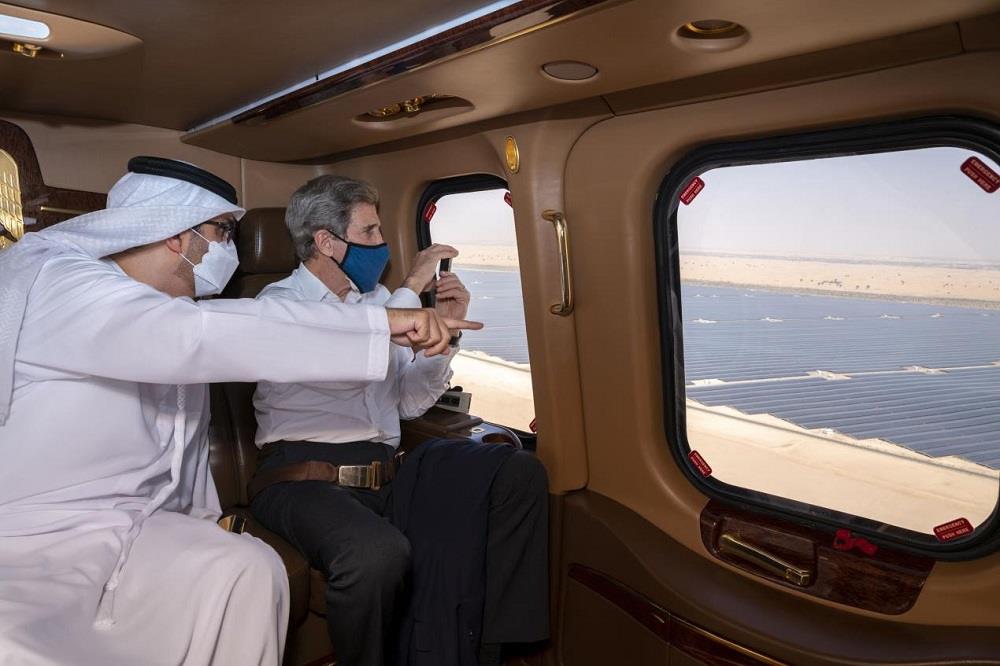U.S. Special Presidential Envoy for Climate, John Kerry, today visited a number of the United Arab Emirates’ (UAE’s)major strategic projects supporting the country’s efforts in the field of clean energy, limiting the consequences of climate change, and promoting sustainable development at the local and global levels.
U.S. Special Presidential Envoy for Climate Kerrytooka helicopter tour over the world’s largest single-site solar project, Noor Abu Dhabi, with His Excellency (H.E.) Dr. Sultan Ahmed Al Jaber, the UAE’s Special Envoy for Climate Change and Minister of Industry and Advanced Technology.U.S. Special Presidential Envoy for Climate Kerry went to the headquarters of the International Renewable Energy Agency (IRENA) as well as MASDAR, a critical contributor to the UAE’s 400% expansion of its renewable energy portfolio over the last ten years.He also visited Mohamed bin Zayed University of Artificial Intelligence (MBZUAI), the world’s first university with curricula devoted to driving sustainability solutions through innovations in artificial intelligence.
The day’s activities included a tour of other key solar installations, including Shams 1, one of the largest concentrated solar power plants in the world, where U.S. Special Envoy for Climate Kerry was briefed on the upcoming 2 GW Al Dhafra Solar Project, which recently set a new record for the lowest solar power tariff at 1.35 cents/kWh.
The U.S. Special Envoy for Climate concluded the day with a visit to Abu Dhabi’s Jubail Mangrove Park. Mangroves, native to the UAE, have the triple benefit of preventing coastal erosion, encouraging biodiversity, and capturing more carbon per hectare than rainforests. With millions of mangroves already planted across its coastal areas, the UAE has committed through its second Nationally Determined Contribution, to planting an additional 30 million by the year 2030.
During the tour, U.S. Special Envoy for Climate Kerry met with a number of senior climate stakeholders in the UAE who outlined the major role the country plays in supporting clean energy projects to address the impact of climate change and mitigate its negative effects on ecosystems and various economic sectors. The UAE plays a pioneering role on climate action at the regional and international levels.
H.E. Dr. Al Jaber said: “The world is watching for concerted action on climate in 2021. U.S. Special Envoy for Climate Kerry’svisit showcases the UAE’s continued commitment to progressive climate action,which the UAE has always viewed as an opportunity to grow and diversify our economy, especially in light of these difficult times and of global efforts to reduce and mitigate the negative impacts of the pandemic on societies.”
H.E. Dr. Al Jaber added: “I’m delighted that U.S. Special Envoy for Climate Kerry has joined us for an important climate dialogue with regional partners that will accelerate global progress toward climate goals. Over the past 15 years, the UAE has made bold commitments on climate change, domestically and internationally, and has demonstrated its ability to act on them. Looking ahead, we look forward to further building on this progress to turn political commitments into new practical solutions with long term economic benefits for the UAE, the MENA region and the world.”
From his part, U.S. Special Envoy for Climate John Kerry expressed delight at his visit to the UAE, noting its part in the efforts to make the 26th United National Climate Change Conference of the Parties (COP26) in Glasgow a success and “address the climate crisis with the seriousness it demands”.
“I’m delighted to have seen the largest solar field in the world’s largest single-site solar project, Noor Abu Dhabi. I also listened to Dr. Al Jaber about the UAE’s plan to lead the world in terms of technology as well as in mitigation of emissions. It’s remarkable to find the UAE trying to lead many other nations in the search for new technology to address the global climate challenge and in transitioning to the new economy while facing this crisis.”
“We face an enormous global challenge and it’s growing in intensity. Tomorrow we will meet with a number of leaders from the region to share thoughts about what can be best done in order to raise our ambitions in Glasgow which is the most important conference after the Paris Agreement.”
The first Regional Climate Dialogue will focus on national and regional preparations for COP26, set to run in November 2021 in Glasgow, Scotland.
The UAE was the first country in the region to sign the Paris Agreement and the first to submit an economy-wide Nationally Determined Contribution (NDC) to reduce emissions compared to business-as-usual in 2030. The UAE is playing its part to prepare for COP26, believing that the need for decisive climate action has grown even greater in a post-COVID world.
The UAE has historically been at the forefront of implementing groundbreaking renewable energy programs, reducing carbon emissions and working with multilateral organizations to shape a more sustainable future for the Middle East region and the rest of the world.Such efforts began with initial investments in the renewable space more than fifteen years ago. The UAE has taken the long view that an energy transition was coming and placed a bet on nascent technologies that have made sound business sense over time.







